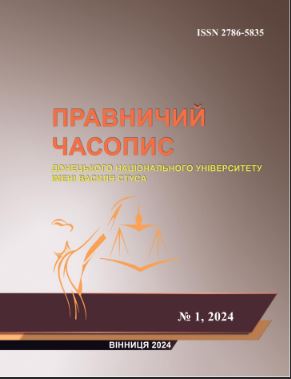The Place and Importance of Freedom in the System of Legal Principles
DOI:
https://doi.org/10.31558/2786-5835.2024.1.2Keywords:
freedom, principles of law, classification of principles, legal system, legal valuesAbstract
The article analyzes the classification characteristics of freedom as a legal principle and defines its special place and significance in the system of principles. The author draws a conclusion about the ontological nature of the basic principles of law including freedom. The principle not only concentrates the world experience of law development, but some principles, such as freedom, make this experience possible and are the basis for its existence. In order to gain legal regulatory experience, there must be starting points that make any order possible. This is the idea of freedom which provides a meaningful toolkit for permissions and prohibitions, incentives and sanctions.
The author notes that the principle of freedom which is a general principle is applicable to any legal reality. Depending on the way the idea of freedom is realized in the principles and rules of law different types of legal systems are manifested, in particular, democratic or totalitarian, liberal, conservative or traditional. The author states that, one way or another, when describing these types of legal reality, attention is primarily drawn to the degree of freedom in society and the limits of its admissibility. Therefore the idea of freedom is important not only as a principle of possibilities, but also of their limits.
The article concludes that the level of legal development of a civilization largely depends on the deployment of the principle of freedom in the legal reality. The idea of freedom as a universal human principle is a criterion of civilizational development of society and is a «principle of principles». Hierarchically for the rule of law, freedom is the supreme principle that gives rise and content to other specific principles of law.
The article argues that freedom is endowed with the highest degree of abstraction because in modern civilization a free individual is a key value and goal for legislators. An encroachment on freedom may be legal only in exceptional cases for the normal functioning of the legal system. The principle of freedom is not only more stable than norms, but can be said to be eternal, since any historical type of social relations is based on the distribution of opportunities among its participants.
References
Герич А. Й., Герич А. В. Становлення та розвиток ідеї свободи як принципу права. Аналітично-порівняльне правознавство. 2023. № 6. С. 719–724.
Козюбра М. Принципи права: методологічні підходи до розуміння природи та класифікації в умовах сучасних глобалізаційних трансформацій. Право України. 2017. № 11. С. 142–164.
Донченко О. П. Свобода як всезагальний принцип права. Проблеми філософії права. 2005. Т. III. № 1–2. С. 307–310.
Рабінович П. М. Основи загальної теорії права та держави: навч. посіб. Вид. 9-те зі змінами. Львів: Край, 2007. 192 с.
Погребняк С. П. Основоположні принципи права (змістовна характеристика). Харків: Право, 2008. 238 с.
Цвік М. Про сучасне праворозуміння. Вісник Академії правових наук України. 2001. № 4. С. 3–13.
Осядла М. В. Свобода як цінність права (теоретико-правовий аспект): дис. … канд. юрид. наук: 12.00.01. Київ, 2016. 202 с.
Грищук О. В., Добош З. А. Конвергенція справедливості і права: філософсько-правовий аспект: монографія. Хмельницький: Хмельницький університет управління та права, 2013. 272 с.

